Oct 2020 2nd edition
Oct 2020 2nd edition Joy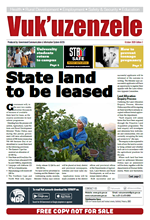
Translations
Alcohol and pregnancy don’t mix
Alcohol and pregnancy don’t mix UrsulaDo not drink any alcohol when you are pregnant. No amount or type of alcohol is safe during pregnancy, as it can cause permanent harm to the unborn baby. 
According to the Foundation for Alcohol Related Research’s (FARR) CEO, Dr Leana Olivier, Foetal Alcohol Spectrum Disorder (FASD) is caused when an unborn baby (foetus) is exposed to alcohol.
“Alcohol has a poisonous effect on the foetus’ developing cells, which can lead to permanent damage to any organ. As the brain starts developing soon after conception, it is the most vulnerable organ. Individuals born with FASD therefore always have some form of brain damage, which leads to developmental delays, learning problems, behavioural and interpersonal challenges,” says Olivier.
“No amount of alcohol is safe during pregnancy. Research indicates that even small amounts have the potential to cause damage,” she adds. This damage cannot be undone or cured.
According to FARR’s research, South Africa has the highest reported rate of FASD, with rates as high as 28% in some communities. This is 14 times higher than the world average of 1.5% (World Health Organisation).
“The prevention of FASD is a community responsibility, not only the responsibility of women of childbearing age. Community members, fathers, family and friends should share the FASD prevention message that ‘no amount of alcohol is safe in pregnancy’,” says Olivier.
FASD affects all cultural, religious and socio-economic groups; there is no low risk.
“Women do not drink intentionally. There are many reasons why pregnant women use alcohol, including not knowing about the harmful effects, stress and peer pressure from their partner or family and friends,” says Olivier.
FARR has 13 projects and community centres in the Free State, Western Cape, Eastern Cape and Northern Cape, and its Training Academy offers training to health, social services and education professionals nationwide. It also provides support nationally, by sharing information, referrals and support groups, and runs a private diagnostic and support clinic.
“Our main focus is our Healthy Mother Healthy Baby Programme, which provides pregnant women with information and the necessary skills to make informed decisions regarding their own health and the health of their unborn babies.
Contact FARR at 021 686 2646. Leave your name and contact number and the organisation will phone you. You can also send an email to info@farrsa.org.za, visit www.farrsa.org.za or send a message via Facebook: @farr.
Alcohol’s tragic effect on motherhood
Alcohol’s tragic effect on motherhood UrsulaWhen *Sharon (35) was pregnant she did not know that drinking alcohol would harm her unborn baby. 
“It is very sad. My child’s brain did not develop normally. He has brain damage and is slow. He was examined by doctors and a psychologist, and they told me he has Foetal Alcohol Syndrome (FAS),” says Sharon.
FAS is a condition in a child caused from alcohol exposure during the mother's pregnancy.
Sharon explains that before her pregnancy, she drank alcohol with her boyfriend and friends on weekends. “This is the way we all hang out here,” says Sharon, who lives in the Northern Cape.
She only found out that she was pregnant at 14 weeks.
“I didn’t plan to fall pregnant, so I did not know. When I was 16 weeks, I joined the Foundation for Alcohol Related Research’s Healthy Mother Healthy Baby Programme in our town. At that stage, I was still drinking on weekends. I did not know that alcohol could damage my baby.
“When I joined the programme, I heard about FAS. I started to drink less, but it was very difficult. My boyfriend could not understand why I did not want to drink with him and our friends, he got very angry,” says Sharon.
Sharon’s son is now almost three-years-old. Her journey is difficult. “My child needs a lot of care and I know he is not like other children. He is young, I am worried about the rest of his life, school and who will take care of him if something happens to me.”
Her message to women is to not fall pregnant if you drink and, if you do, to stop drinking immediately.
“The effect on your baby is serious, it will never recover. All the alcohol in the world is not worth what you will go through if you know that your baby is suffering because he was hurt before he was born. If you do not drink your baby will not have FAS. I know it is very difficult, because I have walked the road, but you have to do it for you, your child and your other children.
“If your boyfriend or husband does not stand by you, you have to leave him. Your child and the future is more important than a partner who does not care. I know now that my relationship with him was abusive, but I have nobody else to blame. I made these bad choices. If only I had known better.”
*Name has been changed to protect the mother’s identity.
Applicants urged to appeal rejected R350 claims
Applicants urged to appeal rejected R350 claims UrsulaThe South African Social Security Agency (SASSA) has urged people to send through their appeals after experiencing an increased number of rejected applications for the R350 COVID-19 grant.
According to the agency, this is attributed to several factors such as incorrect details provided by South Africans who were applying for the grant and information received from institutions such as the Unemployment Insurance Fund and South African Revenue Service databases.
Meanwhile, SASSA said it saw another spike in declined applications in August after it introduced an additional step in the form of a means test.
“This was done to ensure that the requirement for applicants to have no income was met,” SASSA explained.
However, following engagement with the Department of Social Development, parties agreed to reconsider the use of the means test through the banks as a criterion to determine eligibility.
“This will affect the approximately 1.9 million people, who have been receiving the grant to date but who were declined in August,” SASSA said.
An Auditor-General report recently identified about
30 000 undeserving applicants, who received the grant while not meeting the qualifying criteria.
“In response to this finding, SASSA reviewed and strengthened its controls with regard to the evaluation of applications,” the agency said.
SASSA said applications are now considered on their merits on a month-to-month basis, meaning that an application can be approved for one month and rejected the following month if, for instance, their financial situation changed.
“This has become more prevalent with the lockdown levels easing, allowing for some sectors of the economy to return to work, and thus reducing the number of severely distressed citizens.”
However, despite the reduced levels of lockdown, SASSA said it was cognisant that the pandemic had taken its toll and many people were still without an income.
“All applicants whose applications are declined have the right to appeal against the decision," SASSA said, adding that it is currently dealing with about 60 000 appeals.
SASSA is encouraging people to send their appeals to covid19srdappeals@sassa.gov.za. – SAnews.gov.za
Apply for NSFAS at a teachers' centre
Apply for NSFAS at a teachers' centre UrsulaPotential higher education students in need of financial aid will now be able to apply at nearby teacher centres. 
The National Student Financial Aid Scheme (NSFAS) has partnered with the Department of Basic Education (DBE) to use 15 national teachers' centres across the country as application centres for financial aid.
“The aim of the partnership is to reach out to those students who meet the requirements and in need of financial assistance but unable to access NSFAS funding. This is usually due to lack of internet facilities or application resources in their areas,” says NSFAS spokesperson Phatisa Ntlonze.
The DBE has availed the following centres in KwaZulu–Natal − Sizweni Teachers' Centre in Newcastle; King Cetshwayo Teachers' Centre in Empangeni; the Zululand Teachers Centre in Vryheid; Hammersdale Teachers' Centre, Ugu Teachers' Centre in Harding; Umlazi Teachers' Centre situated in the Durban central business district and the Pinetown Teachers' Centre. In the Free State applicants can visit the Xhariep District Teachers' Centre in Koffiefontein.
In the Eastern Cape applications can be done at the Lusikisiki Teachers' Centre; Amathole Teachers' Centre in Butterworth; Libode Teachers' Centre and the Sterkspruit Teachers' Centre.
Applicants who are residents of Mpumalanga can use the Mondi Science, Career Guidance and FET Skills Centre in Piet Retief; Nkangala Teachers' Centre in Maganagobushwa and Bohlabela Teachers' Centre in Graskop.
“These centres are also available to use for free for grade nine pupils who have an interest in studying at any Technical and Vocational Education and Training colleges. Out of school youth who require funding can also use these centres,” says Ntlonze.
Applications for NSFAS funding will close on 30 November 2020.
To find out more about the NSFAS application process you can visit www.nsfas.org.za or call 0800 067 327.
Arts go digital
Arts go digital SiboneloThe Chief Executive Officer of the National Arts Festival Monica Newton says working online will be the new norm for the arts sector.
She says the Coronavirus Disease forced the arts to consider using the digital space in order for artists to continue working.
This was because live events and social gatherings were banned during various stages of the national lockdown.
“Everything was new to us. Our digital future had arrived as a very unexpected reality and we were all adapting new skills as quickly as we could to get the job done. Looking back, we would have done quite a few things differently with the knowledge that we now have,” says Newton.
“We advanced to adopting technology in the space of a few months. There is no question that working online will now be an ongoing part of what we do,” she adds.
Additionally, she says everyone in the sector had to be flexible and brave enough to do something that has never been done before.
For example, this year the National Arts Festival took place on 25 June, and the event organisers had just over 100 days from when the national lockdown was announced in mid-March to make sure that the festival still continued on the set date.
“We filmed 113 productions in eight different venues in the space of three weeks between 1 June and 25 June,” she explains.
This is an example of how the arts community had to adapt to a completely new reality to create and perform works not just for an online audience but one that they could not interact with, except through the eye of a camera.
“It was a major adjustment for everyone including the cast, crew, creators and our partner institutions who help us to bring the festival to life,” she says.
Newton joined the organisation in January 2020 to be part of a team of live events experts that produce five major festivals annually, including Scifest Africa, which is the national science festival, among other events.
She says in October, the organisation is taking Scifest Africa online, especially since the National Arts Festival proved that using technology in the arts is possible.
“The National Arts Festival proved that we can do it. Our mission to create, educate and innovate demands that we must,” says Newton.
For more information about the National Arts Festival visit www.nationalartsfestival.co.za
Benefits of studying at TVET colleges
Benefits of studying at TVET colleges UrsulaSisipho Portia Lolwana (24) says studying at a Technical and Vocational Education and Training (TVET) college provides her with the opportunity of learning the theory and acquiring practical skills she will need in the workplace. 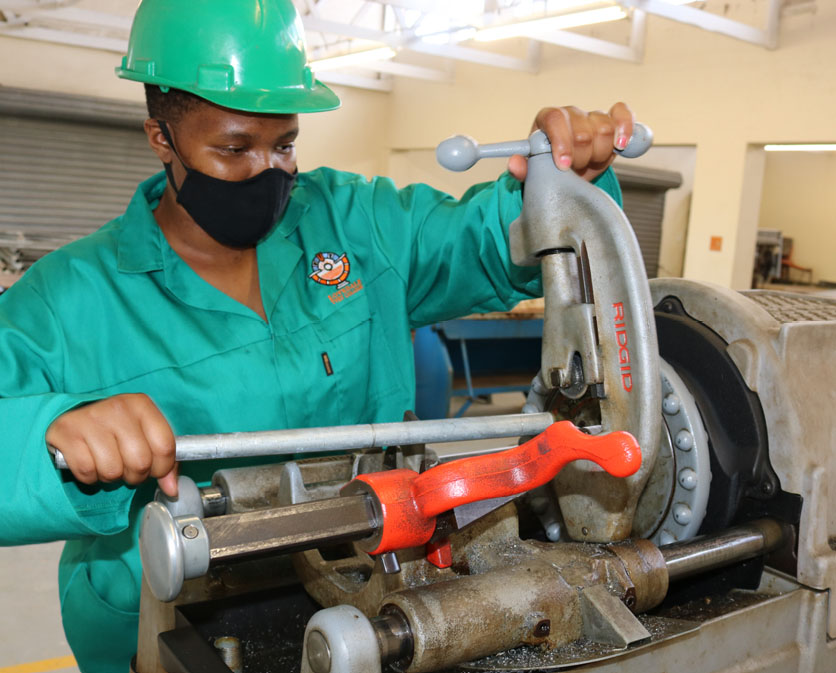
Lolwana of Tsholomnqa village in the Eastern Cape is a level 4 Civil Engineering student majoring in Construction Plumbing at the Lovedale TVET College in King William's Town.
“Enrolling for this course has opened my mind in terms of different career choices I could take. I always thought that engineering was difficult, but now I know it is not,” she says.
Lolwana's educational journey has not been easy, but she found the process so rewarding. She says furthering her studies has proven to her that she can do anything that she sets her mind to.
“Education is important for me as a young person because I do not think I would be able to find employment in future if I do not study,” she says.
She advises young South Africans to consider educational opportunities offered by TVET colleges This is because they will not only learn the theoretical part of their academics but will also be taught how to do the practical work in
becoming plumbers, electricians and technicians, says Lolwana.“TVET colleges offer various career choices, especially in the artisan field which is highly needed in the country,” she says.
Lolwana has plans to study further and become a quantity surveyor and one day run her own business.
TVET colleges bridging the skills gap
In an effort to fight the high unemployment rate in the country, and to bridge the inequality gap in various social classes, government is encouraging learners to consider enrolling with TVET colleges as an alternative to traditional universities.
Government wants more young people to attain skills and competencies that will help them find jobs or create their own enterprises as artisans.
This will also help the country to meet its target of producing 30 000 artisans a year by 2030.
The Department of Higher Education and Training has appealed to Grade 12 pupils who wish to study at TVET colleges in 2021 to apply immediately.
COVID-19 CORONAVIRUS
COVID-19 CORONAVIRUS SiboneloCoronaviruses are a large family of viruses which may cause respiratory infections ranging from the common cold to more severe diseases such as Middle East
Respiratory Syndrome (MERS) and Severe Acute Respiratory Syndrome (SARS). The most recent Coronavirus disease is COVID-19
Typical symptoms include cough, runny nose, fever and shortness of breath
Monitor your health closely
- All travellers to monitor their health closely for 14 days upon returning to south africa
- If you have a fever, cough or running nose, wear a mask and seek medical attention promptly
- Call the clinic or doctor ahead of your visit or the NICD Hotline: 0800 029 999
Precautions to take
- Wash hands frequently with soap
- See doctor if you unwell
- Cover your mouth with a tissue paper when coughing or sneezing
- Observe good personal hygiene at all times
CONTACT the NICD Hotline: 0800 029 999
Cotton farmers weave their way to success
Cotton farmers weave their way to success SiboneloA group of cotton farmers are weaving a path to commercial success by working together to produce cotton.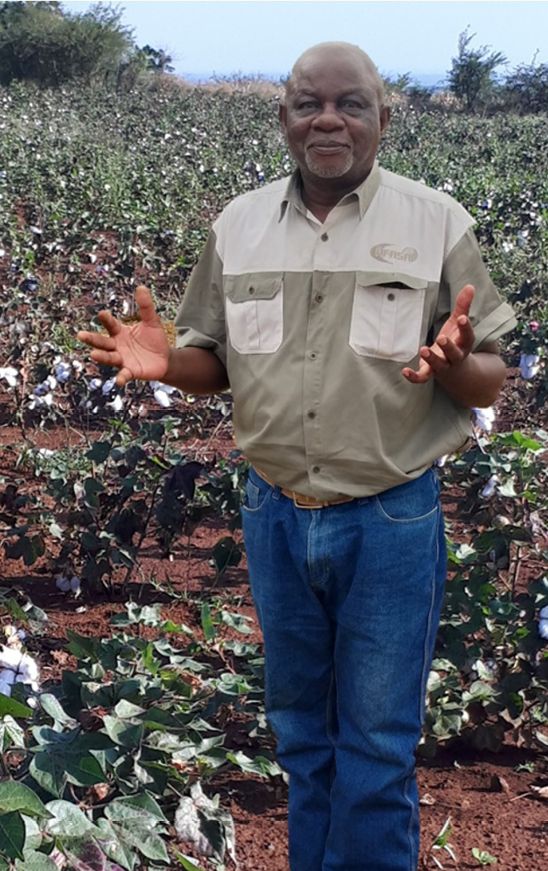
The Lebombo Secondary Cooperative in Malelane, Mpumalanga has brought together 29 primary cooperatives to produce cotton that is used for clothing and animal feed, says Petros Sithole, the chairperson of the Lebombo Secondary Cooperative.
“The primary cooperatives use 3 000 hectares to produce the cotton. At the peak of the harvest in 2016 we were able to produce 2 million kilograms of raw cotton,” says Sithole.
He adds that the primary cooperatives are made up of 1 188 farmers who employ seasonal 4 500 employees during the November to May planting and harvesting period. Women represent 63% of the workers.
The cotton produced by the Lebombo Secondary Cooperative is sold at the Loskop Ginnery where it is processed.
The cooperative is looking to expand its operations by opening its own gin where it will process the cotton it produces. A cotton gin is a machine used for cleaning cotton of its seeds.
Sithole says the move is to add value to their cotton in order to sell it at a higher price.
“We have formed a company in partnership with the National Empowerment Fund (NEF). The Lebombo Cotton Gin company is
51% owned by us while the other 49% is owned by the NEF. At the moment the NEF is doing studies of which land will be suitable to build the gin on.”
The NEF has already supported the cooperative with R7.4 million to do a feasibility study on whether the gin will succeed.
The NEF’s Emmanuel Mohlamme says the decision to build a gin for the farmers is to assist the cooperative to make a profit.
Through assistance from the NEF’s Socio-Economic Development Unit the Lebombo Secondary Cooperative professionalised itself by updating and observing all cooperative governance requirements.
For more information on applying for funding from the NEF call 0861 843 633.
Countdown to 2020 matric exams
Countdown to 2020 matric exams SiboneloThe countdown to the matric examinations has begun, with just weeks to go until candidates sit for the 2020 National Senior Certificate (NSC) examinations.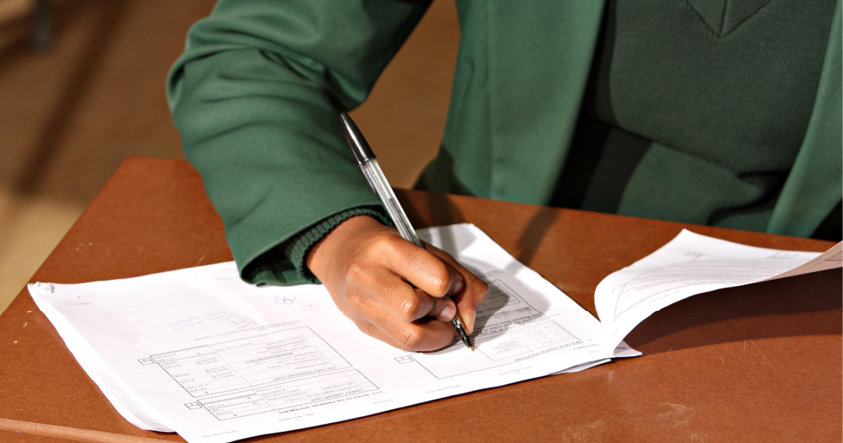
The writing of the 2020 NSC examination will start on 5 November 2020 and end on 15 December 2020.
The Department of Basic Education rescheduled the exams to accommodate the disruptions caused by the COVID-19 pandemic.
“Today, we launch the official countdown to the examinations. It is now 34 days to the start of the NSC examination for the Matric Class of 2020.
"We appeal to parents, guardians and communities to rally behind all the candidates who will be writing their final exams this year. It is an extraordinary time for them and all of us, but they need the support more,” says Basic Education Minister Angie Motshekga.
The Minister was speaking at a briefing to give an update on key developments in the basic education sector relating to the COVID-19 Alert Level 1 restrictions.
The June Senior Certificate examination was postponed, and will now be written together with the NSC examination in November 2020.
The examination timetable for the combined June and November examination had to be amended so that this examination commences in November instead of October 2020, as was initially planned.
“The late start of the examination is intended to allow as much time as possible to cover critical curriculum content, and to ensure that all examination processes are appropriately managed,” said the Minister.
The combined examination makes this the largest public examination that has been administered in the country. A total of 1 058 699 candidates will sit for the examinations.
“We certainly have never had to manage a number that large before. It is going to be a huge task, but one that we will need to ensure is managed and coordinated smoothly.
“All examination centres, both public and independent have been audited in preparation for the 2020 combined examination,” said Motshekga.
A protocol, to ensure compliance with COVID-19 rules, has been developed and distributed to guide all the chief invigilators, invigilators and all other officials involved in the management of the conduct and administration of the examination.
All provincial education departments have secured the extra rooms at existing examination centres, which are needed for the writing of the combined 2020 November Grade 12 examinations.
“It has been a difficult year, but there is still an opportunity to get tangible work done. We will need to work together with all stakeholders, strengthen our partnerships, intensify our efforts and rescue the country from a possible disaster brought on us by the COVID-19 pandemic,” said the Minister.
Since the country migrated to Alert Level 1, the department is operating at full capacity under strict health and safety protocols.
“We want to continue to ensure safety for everybody. We wish to thank all South Africans for the support we have received. As individuals, we can indeed travel faster, but together, we can travel far,” said the Minister. –
SAnews.gov.za
Government to upgrade road infrastructure
Government to upgrade road infrastructure UrsulaGovernment continues to make strides in prioritising road infrastructure that affects the livelihood of people, says Transport Minister Fikile Mbalula. The Minister was recently speaking at the launch of Transport Month at the Mpumalanga Regional Stadium in Hammarsdale, KwaZulu-Natal. 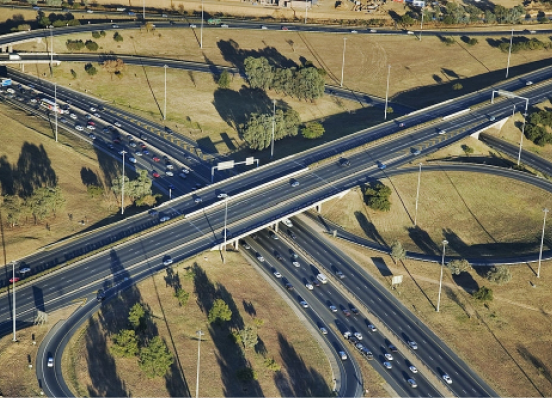
Minister Mbalula says the South African National Roads Agency (SANRAL) is committed to commissioning new road construction, upgrading, rehabilitating old and maintaining existing roads. “The backlog in our road infrastructure remains a source of concern,” Minister Mbalula says.
The Minister noted that the R400 million Hammarsdale Interchange investment has also encouraged and facilitated industrial expansion in the area, which has led to expanded economic activity.
“We chose this venue so we can also celebrate the magnificent Hammarsdale Interchange, recently completed under the expert engineering prowess of our roads agency, SANRAL.”
Apart from improving travel into and out of Hammarsdale, the upgrade saw an increase from two to five lanes.
The project produced jobs for nearly 250 locals and resulted in a wage bill of R46.8 million, which was directly injected into the community.
A further R7.9 million was spent on jobs for women – another key transformation objective in this industry.
“In our quest to create opportunities for black businesses to grow and prosper, contracts to the value of R41.6 million were awarded to 16 local businesses for the provision of plant and materials to the project,”says Minister Mbalula.
Moloto Road upgrades
The Minister also announced that work is on track to upgrade Moloto Road, which is notorious for fatal crashes.
“We listened to the pleas of local communities and road users, and have responded by transferring the totality of Moloto Road across the provinces of Gauteng, Mpumalanga and Limpopo to SANRAL,” he said, adding that R4.5 billion has been allocated for this project for five years.
The development has already trained 135 small, medium and micro enterprises and 185 non-governmental organisations from Thembisile Hani Local Municipality to improve their chances of participating in the construction industry.
The department will also be embarking on improving the N2 and N3 in KwaZulu-Natal.
The revamp of the N2 will focus on a 55-km stretch from Lovu River on the South Coast to Umdloti on the North Coast, while the N3 will look into an 80-km section from Durban to Pietermaritzburg.
SAnews.gov.za
Growbox ensures food security for locals
Growbox ensures food security for locals UrsulaThe Coronavirus Disease and nationwide lockdown highlighted the need for food security in the country’s most vulnerable communities. 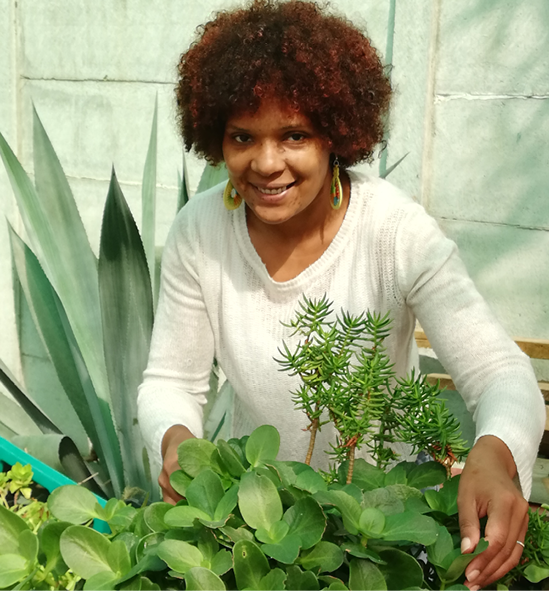
This is according to Growbox founder Renshia Manuel (38), who is working on a project to introduce sustainable vegetable farming in the Cape Flats and Hanover Park in Cape Town.
“The fact that millions have lost their jobs or are trying to find alternative incomes, due to fewer working hours or rising food prices, makes us want to do even more to make a difference in our communities,” says Manuel.
She aims to launch a fully fledged vegetable production farm, called the Urban Farmers’ Market, on 1 November.
The first project phase is the farming area, in which vegetables are being grown organically. “A portion of this harvest will be supplied to soup kitchens within the community, but the bulk will be sold at economical prices to the local community. By cutting out vegetable agents and transportation costs, we can sell at prices locals can afford,” says Manuel.
The market will cater to low-income households that cannot afford store-bought produce and will provide a safe, family-friendly and holistic place for economic opportunities for the vendors.
“The market will also provide members of the community with sustainable farming skills. Those financially affected by the pandemic will gain experience in farming produce and selling it at the market,” says Manuel.
Local participation
The local community has been involved from the start of the project.
“When we first needed to excavate the site for farming, there was so much community interest that we invited four local non-governmental organisations to assist when we started planting.
Their support is overwhelming and their members assist us on planting days.
The community is also involved in the Urban Farmers' Market, as all committee members are from the local community.
“We encourage locals to pop by and visit. They can assist with planting or sowing or spend some quiet time away from their busy schedule. If they are looking for advice for their own garden, we are happy to assist. We always have extra pairs of gloves on standby,” says Manuel.
Community members interested in the project can send a WhatsApp to 076 303 3205 or an email to info@growboxnursery.com.
How to avoid cyberbullies
How to avoid cyberbullies SiboneloCyberbullying, also known as online bullying, is the same as face-to-face bullying, except that it takes place online or electronically, such as on social media; via SMS and instant messaging apps, such as WhatsApp and Messenger; and on email.
Cyberbullies share a person’s private information to embarrass them; post rude messages; threaten their victims; try to get their victims to commit acts of violence; stalk their victims; and post child pornography or threaten to post it.
Usually, the victim does not know who the cyberbully is.
The effects of cyberbullying are varied and long-lasting, often impacting the victim’s mental well-being.
Tips to avoid cyberbullying
Following these tips to avoid being bullied electronically:
- Stay away from strangers on social media. People create fake profiles and send you a friend request. If you receive a friend request from someone you do not know, do not accept it. Some people also steal your friends’ photographs and names and then send a friend request to you. Always check your friend’s profile to make sure the new request is not fake.
- Do not post personal information on social media. Posting information such as your address or routine may invite criminals to use this information against you.
- Do not believe everything you read online. People often post false or misleading information about various topics. Always verify the information before commenting or taking any action.
- It is best to not have a public account. Look at your security settings to see who can see your information and posts. If you have a public account, anyone can view your profile. Review these settings often as sites can change their options.
- Even if you have a private account, there is still a risk that your information could be exposed. Do not post anything you would not want the public to see.
- Be careful of what you post. Do not share anything that could hurt or embarrass anyone.
- Do not open emails from sources you do not know.
- Do not download attachments unless you are expecting one from someone.
- Stop downloading free media from software that is not legally approved. This software is not regulated.
Information supplied by the Department of Communications and Digital Technologies.
How to prevent teenage pregnancy
How to prevent teenage pregnancy UrsulaFalling pregnant when you are a teenager will affect the rest of your life, but there are ways to keep yourself safe from an unplanned pregnancy. 
There are various ways to prevent teenage pregnancy, including choosing not to have sex until you are married or ready to have children.
Some people think that abstinence (choosing to not have sex until you are married) is old-fashioned, while others think it is morally the best thing to do. Teenagers, however, need to decide for themselves.
Many people do not want to wait until they are married before having sex. They also do not want to rush into anything and make costly mistakes. They often decide that delaying having sex until they are older, more responsible, in a stable relationship with one partner and have a job, is the best thing to do.
If you choose abstinence or delaying sex, there are other things you can do to protect yourself:
- Choose your friends carefully. Friends should want what is best for you and should respect your decision not to have sex.
- Beware of situations that could be unsafe, like friends drinking or taking drugs, that could lead to unsafe sex.
- Beware of partners who claim that you will sleep with them if you love them.
- Listen to and learn from those who have gone through teenage pregnancy. They know the mistakes and disadvantages.
- Listen to and learn from your parents about their life experiences.
If you decide that abstinence and delaying sex are not the best decisions for you and you would rather not wait, take the time to learn about protection, including contraception, which is using a method (mechanical or chemical) to prevent pregnancy.
There are various contraceptives that work in different ways, but they are all designed to prevent pregnancy. They include oral contraception, known as ‘the pill’; injectable contraception; and male and female condoms.
What can I do if I’m pregnant?
If you think you might be pregnant, take someone you trust with you to your nearest clinic to have a pregnancy test.
Antenatal care (taking care of the unborn baby) is important and usually starts at eight weeks. Your local clinic can help you with antenatal care and a healthcare worker will assist you to develop a plan that is suitable for you and your baby.
If you are pregnant, it is important to eat healthy nutritious food, exercise, get enough sleep and avoid drugs and alcohol.
*This information was supplied by the KwaZulu-Natal Department of Health.
Jobs: Department of Employment and Labour
Jobs: Department of Employment and Labour SiboneloDirector: Public Employment Services (2 posts)
Centre: Provincial Office: Limpopo
Ref No: HR4/10/20/30LP (1 post)
Provincial Office: Gauteng
Ref No: HR4/10/20/35GP (1 post)
Salary: All inclusive:
R 1 057 326 per annum.
Enquiries: Mr X Sicwebu,
Tel: (012) 309 4382
Applications: Chief Director: Human Resources Management: Private Bag X 117, Pretoria, 0001
Email: Jobs-HQ@labour.gov.za
Legal Administrative Officer Grade 1 to Grade 2
Centre: Provincial Office: Free State
Ref No: HR 4/4/8/274
Salary: R 198 411 – R 480 921
per annum(OSD)
Enquiries: Mr. S Zakwe,
Tel: (051) 505 6321
Applications: Chief Director: Provincial Operations:
PO Box 522, Bloemfontein, 9300
Email: Jobs-FS@labour.gov.za
Principal Inspector: Occupational Health and Hygiene (X2 posts)
Centre: Provincial Office: Northern Cape
Reference No: HR 4/4/8/29
Salary: R470 040.00 per annum
Enquiries: Mr IS Vass
Tel: (053) 8381652
Applications: Chief Director: Provincial Operations: Private
Bag X 5012, Kimberley, 8301
Email: Jobs-NC@labour.gov.za
Occupational Health and Safety Specialist
(1 year contract)
Centre: Head Office, Pretoria
Reference No: HR4/20/10/10 HO
Salary: All inclusive:
R 1 057 326.00 per annum
Enquiries: Ms. M Matyila,
Tel: 012 309 4026
Applications: Chief Director: Human Resources Management: Private Bag X 117, Pretoria, 0001
Email: Jobs-HQ@labour.gov.za
Deputy Director: Administration and Strategic Support.
Centre: Head Office, Pretoria
Reference No: HR 4/20/10/08HO
Salary: All inclusive:
R 733 257.00 per annum
Enquiries:Mr MT Ntleki,
Tel: (012) 309 4264
Applications: Chief Director: Human Resources Management: Private Bag X 117, Pretoria, 0001
Email: Jobs-HQ@labour.gov.za
Senior Manager: Medical Services Grade 1 to Grade 2
Centre: Provincial Office: Free State- Ref No: HR 4/4/8/274
Salary: Grade 1: (R1 362 366 –
R1 467 651) per annum(OSD)
Grade 2: (R1 512 009-R 1 628 850) per annum(OSD)
Enquiries: Ms E Maneli,
Tel: (051) 505 6203
Applications: Chief Director: Provincial Operations: PO Box 522, Bloemfontein, 9300
Email: Jobs-FS@labour.gov.za
Deputy Director: Employment Relations (Grievance, Dispute and Discipline)
Centre: Head Office, Pretoria
Reference No: HR 4/20/10/02 HO
Salary: All inclusive: R 733 257
per annum
Enquiries: Ms T Roos,
Tel: (012) 309 4720
Applications: Chief Director: Human Resources Management: Private Bag X 117, Pretoria, 0001
Email: Jobs-HQ@labour.gov.za
Deputy Director: Occupational Health, Safety and Employee Wellness (9 posts)
(1 Year Contract)
Centre: Provincial Office:
Gauteng-Reference No: HR4/20/09/01 GP (1 post)
Provincial Office: KwaZulu-
Natal-Reference
No: HR4/20/09/02 KZN (1 post)
Provincial Office: Mpumalanga
Reference No: HR4/20/09/03
MP (1 post)
Provincial Office: North-West Reference No: HR4/20/09/04
NW (1 post)
Provincial Office: Free State Reference No: HR4/20/09/05
FS (1 post)
Provincial Office: Northern Cape Reference
No: HR4/20/09/06
NC (1 post)
Provincial Office: Limpopo
Reference No: HR4/20/09/07
LP (1 post)
Provincial Office: Western Cape Reference No: HR4/20/09/08
WC (1 post)
Provincial Office: Eastern Cape Reference No: HR4/20/09/09
EC (1 post)
Salary: All inclusive:
R 733 257.00 per annum
Enquiries: Ms. M Matyila,
Tel: 012 309 4026
Applications: Chief Director: Provincial Operations:
Private Bag X 5012, Kimberley, 8301
Email: Jobs-NC@labour.gov.za
Applications: Chief Director: Provincial Operations:
Private Bag X 9368 Polokwane, 0700
Email: Jobs-LP@labour.gov.za
Applications: Chief Director: Provincial Operations: P O Box 522, Bloemfontein, 9300
Email: Jobs-FS@labour.gov.za
Applications: Chief Director: Provincial Operations:
Private Bag X 2040,
Mmabatho, 2735
Email: Jobs-NW@labour.gov.za
Applications: Chief Director Provincial Operations: Provincial Office: Private Bag X 9005, East London, 5200
Email: Jobs-EC@labour.gov.za
Applications: Chief Director: Provincial Operations: PO Box 4560, Johannesburg, 2001
Email: Jobs-GP@labour.gov.za
Applications: Chief Director: Provincial Operations: P O Box 872 Cape Town, 8000
Email: Jobs-WC@labour.gov.za
Applications: Chief Director Provincial Operations: Private Bag X 7263, Emalahleni, 1053
Email: Jobs-MP@labour.gov.za
Applications: Chief Director: Provincial Operations:
P O Box 940, Durban, 4000
Email: Jobs-KZN@labour.gov.za
Principal Inspector: Civil and Construction Engineering
Re-advertisement:
those who applied before are
encouraged to apply again)
Centre Polokwane
Ref No: HR4/4/6/137
Salary: R 470 040 per annum
Enquiries: Ms. S Lebogo,
Tel: 015 290 1666
Applications: Chief Director: Provincial Operations: Private
Bag X 9368 Polokwane, 0700
Email: Jobs-LP@labour.gov.za
Principal Inspector: Mechanical Engineering
Centre: Labour Centre Polokwane
Ref No: HR4/4/6/138
Salary: R 470 040 per annum
Enquiries: Ms. S Lebogo,
Tel: 015 290 1666
Applications: Chief Director: Provincial Operations: Private
Bag X 9368 Polokwane, 0700
Email: Jobs-LP@labour.gov.za
Counsellor Grade1-3 (2 posts)
Centre: Labour Centre:
Modimolle
Ref No: HR4/4/6/143 (1 post)
Labour Centre: Jane Furse
Ref No: HR4/4/6/129 (1 post) (Re-advert, previous
applicants must re-apply)
Salary: Grade 1: R579 147 -
R642 765 (OSD)
Grade 2: R662 190 –
R734 928 (OSD)
Grade 3: R750 024 –
R832 398 (OSD)
Enquiries: Ms TE Maluleke,
Tel: (015) 290 1768
Applications: Chief Director: Provincial Operations: Private
Bag X 9368 Polokwane, 0700
Email: Jobs-LP@labour.gov.za
Principal Inspector: Occupational Health and Hygiene (2 posts)
Centre: Provincial Office:
Northern Cape
Ref No: HR 4/4/8/29
Salary: R 470 040 per annum
Enquiries: Mr IS Vass
Tel: (053) 8381652
Applications: Chief Director: Provincial Operations: Private Bag X 5012, Kimberley, 8301
Email: Jobs-NC@labour.gov.za
Audit Committee Chairperson
Centre: Internal Audit,
Head Office, Pretoria
Reference No: HR4/20/10/01HO
Duration: Three years contract
Remuneration: Member will be remunerated according to rates approved by the Department
Enquiries: Ms Malekgotla Nkuna, Tel: (012) 309 4336/4428
Applications: Chief Director: Human Resources Management: Private Bag X 117, Pretoria, 0001
Email: Jobs-HQ@labour.gov.za
Assistant Director: IT
Administration & Office Service
Centre: Provincial Office: Free State- Ref No: HR 4/4/8/290
Salary: R 376 596 per annum
Enquiries: Ms. N Tokwe,
Tel: (051) 505 6204
Applications: Chief Director: Provincial Operations: P O Box 522, Bloemfontein, 9300
Email: Jobs-FS@labour.gov.za
Senior Legal Administration Officer (MR6)
Centre: Head Office, Pretoria
Reference No: HR 4/20/10/11 HO
Salary: R473 820.00 –
R1 140 828.00) (OSD)
Enquiries: Prof V Singh,
Tel: (012) 309 4611
Applications: Chief Director: Human Resources Management:
Private Bag X 117, Pretoria, 0001
Email: Jobs-HQ@labour.gov.za
CLOSING DATE FOR APPLICATIONS: 02 November 2020 16:00 Full details visit www.labour.gov.za
NOTE: Applications quoting the relevant reference number must be submitted on form Z83, obtainable from any Public Service Department or on the internet at www.gov.za/documents. The fully completed and signed form Z83 should be accompanied by a recently updated, comprehensive CV as well as recently certified copies of all qualification(s), academic transcripts including senior certificate, ID-document and a Driver’s license where applicable. The certification must be not older than six (6) months from the date of the advert. Non-RSA Citizens/Permanent Resident Permit Holders must attach a copy of their Permanent Residence Permits to their applications. Should you be in possession of a foreign qualification, it must be accompanied by an evaluation certificate from the South African Qualification Authority (SAQA). Applicants who do not comply with the above-mentioned requirements, as well as applications received late, will not be considered. The Department does not accept applications via fax. Failure to submit all the requested documents will result in the application not being considered. Correspondence will be limited to short-listed candidates only. If you have not been contacted within eight (8) weeks after the closing date of this advertisement, please accept that your application was unsuccessful. Suitable candidates will be subjected to a personnel suitability check (criminal record, citizenship, credit record checks, qualification verification and employment verification). The Department reserves the right not to make any appointment(s) to the above post. A pre-entry certificate obtained from National School of Government (NSG) is required for all SMS applicants. The course is available at the NSG under the name Certificate for entry into SMS and the full details can be obtained by following the below link:https://www.thensg.gov.za/training-course/sms-pre-entryprogramme/. All shortlisted candidates for SMS posts will be subjected to a technical competency exercise that intends to test relevant technical elements of the job, the logistics of which be communicated by the Department. Following the interview and technical exercise, the selection panel will recommend candidates to attend generic managerial competencies using the mandated DPSA SMS competency assessment tools. The successful candidate will be expected to sign an Internship performance agreement. The Department of Labour is an equal opportunity affirmative action employer. The employment decision shall be informed by the Employment Equity Plan of the Department. It is the Department’s intention to promote equity (race, gender and disability) through the filling of this post(s).
Looking for a government job?
Government jobs are advertised on the Department of Public Service and Administration website, www.dpsa.gov.za, in our Vuk’uzenzele newspaper, and in other reputable publications.
Please be aware of any job offers that ask for any form of payment – you will never be asked to pay a fee to apply for any government job.
Websites:
www.gcis.gov.za
www.vukuzenzele.gov.za
E-mail: vukuzenzele@gcis.gov.za
Tel: (+27) 12 473 0303
To Advertise Contact: (012) 473 0303 or (012) 473 0010
KZN man gets two life sentences for raping nieces
KZN man gets two life sentences for raping nieces SiboneloA KwaZulu-Natal man was recently given two life sentences and 20 years imprisonment in the Estcourt Regional Court for raping and assaulting his two nieces.
According to the National Prosecuting Authority (NPA), the two victims, aged 13 and 14, went to live with their maternal grandmother from 2016 to 2018 after their mother passed away.
“From then on, their mother’s brother raped them at various occasions. Once, he tied the hands of one of the victims with a rope and suspended her from the roof of the house. He then used a pair of pliers to pinch her all over her torso,” says the NPA.
The 23-year-old man hails from Winterton.
The abuse came to light when one sister fell pregnant and told her father about the abuse that she and her sister suffered at the hands of their uncle.
Regional Court Prosecutor, Advocate Zwelethu Mata, led the testimonies of the two victims, as well as the DNA linking the accused to the offences and victim impact statements.
“Both the victims says the trauma they endured haunted them every day. They had become withdrawn and wary of men. Also, their performance at school had been severely affected.”
The accused maintained in court that the sexual intercourse was consensual and has since been found guilty and sentenced.
His name will also be enrolled in the National Register for Sex Offenders and will be declared unfit to work with children.
The Director of Public Prosecutions in KwaZulu-Natal, Advocate Elaine Zungu, has welcomed the sentence and conviction.
“The accused was in a position of trust and it was his responsibility to take care of the children, not abuse them in such a heinous manner. This sentence is indicative that the State is actively dealing with cases of this nature,” Adv Zungu said.
President Cyril Ramaphosa has on several occasions spoken out against gender-based violence.
“So long as this country’s women and children live in fear from violence, we cannot regard ourselves as totally free.
"So long as women are being harassed, abused, beaten, raped and murdered, we cannot say we are a civilised society,” says the President. – SAnews.gov.za
Kabokweni entrepreneurs make their mark
Kabokweni entrepreneurs make their mark UrsulaNick and Nicole Nyalungu are the inspiring entrepreneurs behind Nick and Nichol’s, a growing brand that has been making a range of vegan leather products since 2016. 
Nick and Nichol’s transforms discarded inner bicycle and car tyre tubes into designer shoes, bags and more.
The husband and wife team, both 33, rescue the tubes from landfills, before upcycling them into unique products - literally taking waste that takes years to degrade and putting it to good use.
“We are artists who create functional art. We call our products Vegan Fashion because of how much they look like leather, but no animal was killed to make it,” says Nick.
While Nicole makes the patterns and does the final hand stitching, Nick does most of the sewing. They are both self-taught.
The entrepreneurs operate from home, in Kabokweni, Mpumalanga. Their business idea was born when, after a few personal events, they started talking about what they could do to change themselves.
“We wanted this dirty unwanted tube to be loved and appreciated again. It gets a second chance. It wasn’t intentional that we found ourselves making vegan-friendly products, it just so happened that the tube looks a lot like leather when it’s made into a bag,” says Nick.
Nick and Nicole are as trendy, savvy and creative as the products they craft, and they are committed to not only creating magic out of nothing, but also to skills transfer.
Driven by their faith and the determination to ‘do it for themselves’ and uplift others, they are teaching youngsters how to create marketable products from scraps so that they too can become self-sustaining.
“We have successfully trained one person so far. Since we moved to Kabokweni two months ago, we have also involved two young ladies from the area who assist part time.”
Their message for youth is to begin by identifying problems that resonate with your interests. “From there, identify solutions for those problems. Before you know it, a way to make money from the solutions will show itself.”
For more information, visit www.nickandnichols.co.za.
Keeping the skies safe
Keeping the skies safe UrsulaEveryday Nwabisa Vitshima protects the lives of thousands of people. Vitshima is an air traffic controller at the East London Airport. She directs airplanes to land and take-off safely, and is part of the team that prevents accidents. 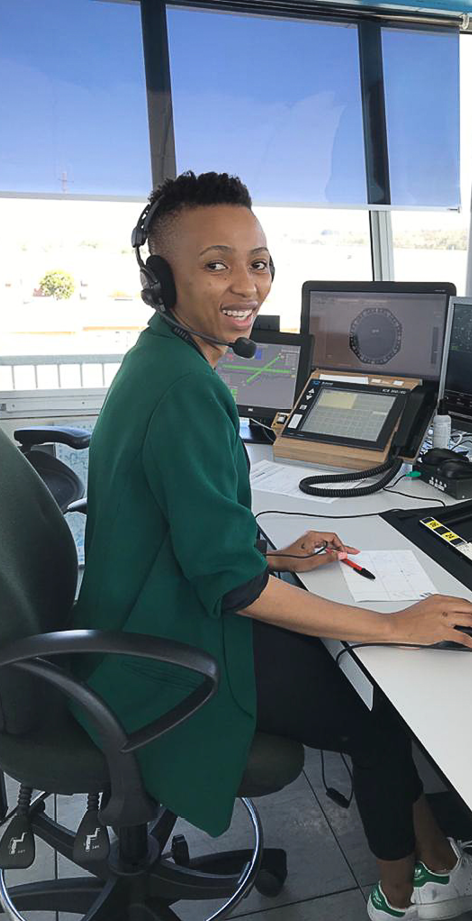
Vitshima (32), grew up in the small Eastern Cape village of Sidwadweni. She excelled at school and went on to get a university degree in analytical chemistry. After receiving her degree, she was looking for a job, when her aunt saw an advertisement in an elevator from the Department of Transport.
The department was looking to recruit air traffic controllers from the Eastern Cape.
“At first, I was not too keen, because I did not know anything about airplanes and thought that air traffic controllers were actually the marshals on the ground,” says Vitshima.
However, her aunt convinced her to apply, and during the interview process, Vitshima became convinced that being an air traffic controller was what she wanted to do.
Vitshima began as an assistant air traffic controller with Air Traffic Navigation Services in 2013, and then became a full air traffic controller in 2015.
Everyday, she sits at her station in the air traffic control tower, communicating over radio with pilots and helping them to safely land and takeoff.
“We make sure that airplanes remain separated from each other. Some airplanes can have as many as 300 people on board, so we ensure that all of these people can get to their destinations safely,” says Vitshima.
She explains that the job requires concentration, good communication skills, memory, the ability to work under pressure and being able to work in a team.
“There is no room for error, because one small mistake can cost peoples’ lives. Everything has to be accurate and well-calculated. You are also dealing with a lot of different personalities and pilots, so you have to be able to communicate effectively with them.”
Vitshima says that young people who want to become air traffic controllers should focus on studying Mathematics and English at school.
“You need to be able to communicate well in English, and Mathematics helps you with problem-solving skills.”
Air Traffic Navigation Services offers a bursary programme for young people who want to work in the industry. For more information, go to the ATNS website at atns.co.za.
Mooikloof Mega City to address housing for "missing middle"
Mooikloof Mega City to address housing for "missing middle" JoyPresident Cyril Ramaphosa recently launched the Mooikloof Mega Residential City in Tshwane, Gauteng, which is geared to address the housing needs of the “missing middle”.
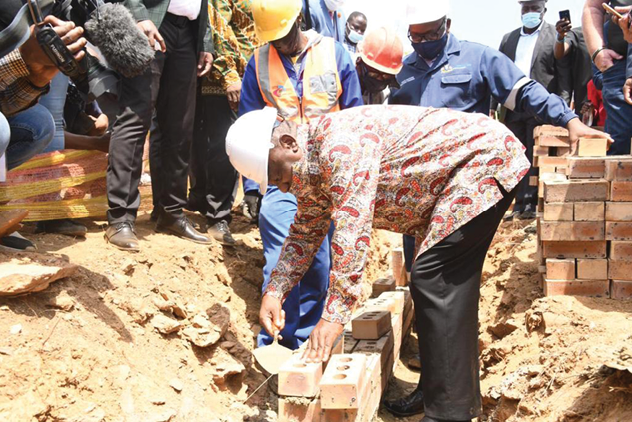 The public-private partnership development seeks to assist the missing middle -- people who earn too much to qualify for fully subsidised housing but who do not earn enough to afford debt-financed housing in areas of their choice.
The public-private partnership development seeks to assist the missing middle -- people who earn too much to qualify for fully subsidised housing but who do not earn enough to afford debt-financed housing in areas of their choice.
The President was joined at the launch by Public Works and Infrastructure Minister Patricia de Lille; Human Settlements, Water and Sanitation Minister Lindiwe Sisulu; Gauteng Premier David Makhura, City of Tshwane Administrator, Mpho Nawa and Balwin Properties CEO, Stephen Brookes.
The Mooikloof Integrated Development is the outcome of a successful public-private partnership between the developers Balwin Properties, the provincial government and the City of Tshwane.
The development has a total project value of over R84 billion and is one of the 62 Strategic Integrated Projects (SIPs) that were gazetted at the end of July.
The listing of the SIPs followed the inaugural Sustainable Infrastructure Development Symposium in June, which managed to unlock over R340 billion in private sector investment in key economic sectors.
“That we are already seeing the brick and mortar results of this strategic infrastructure project is immensely encouraging.
“...When I said last year that we must Khawuleza or hurry up in meeting our people’s needs, the City of Tshwane and the province took heed,” says the President.
The first phase of the project is residential developments, and some
50 000 sectional title units are planned.
“This development has all the key features of spatial integration. It is located in one of the most sought-after addresses in the City of Tshwane, with some of the highest average house prices. It is a nodal development, giving residents and tenants easier access to vital transportation corridors.
“The successful launch of Mooikloof further reinforces the appropriateness of the District Development Model, and the collaboration of the three spheres of government has made the project possible,” said the President.
The City of Tshwane has facilitated the approval of appropriate zoning and the provision of water, waste-water, and energy bulk infrastructure.
“I trust that as government, we are walking the talk on enabling conditions for development by issuing licences and zoning rights speedily. ”
Potential homeowners will also be able to apply for assistance from government’s Finance Linked Individual Subsidy Programme. The development is tipped to create 41 000 jobs. SAnews.gov.za
NDA focuses on gender-based violence
NDA focuses on gender-based violence UrsulaThe National Development Agency (NDA), part of government’s social development portfolio, is focusing on providing support to gender-based violence (GBV) care centres throughout the country during the month of October. 
With October being Social Development Month, the agency has decided to put all its efforts into addressing one of the biggest challenges facing South Africa, as (GBV) continues to plague the country.
The NDA has scheduled visits for Social Development Minister Lindiwe Zulu to various GBV centres in Gauteng, Limpopo, Western Cape and Free State. The centres are run by civil-society organisations (CSOs) that are being supported by the R100-million funding provided through the Criminal Assets Recovery Account (CARA) Funds Account, which supports organisations that provide services to victims of crime, GBV and femicide (GBVF).
“The visits will be oversight visits but more so to evaluate the impact of the programme and if services are responding to the need within communities,” said Makgodu Tsehloane, Marketing and Communications Manager at the NDA.
To date, a total of 170 contracts have been signed and the first payment has been transferred to 131 organisations to the value of R17.4 million. An additional R17.4 million has been committed as second phase of payment for the contracted organisations. The process of contracting the remaining 142 organisations is currently underway.
The funding is made available through the NDA over a period of 24 months. R95 million is set aside for direct financial support to organisations while R5 million will be used for mentoring and coaching of emerging CSOs in the social development sector. The first R45 million has already been transferred for providing services to victims and survivors of GBVF, focusing on family strengthening, social crime prevention, social behaviour change and welfare services.
Food distribution
Meanwhile as part of Social Development Month, Minister Zulu will also engage with some of the 200 CSOs that have partnered with the NDA through the COVID-19 Volunteer Programme, where volunteers have been deployed to distribute food parcels and other essentials to elderly and disabled members of communities.
Thamo Mzobe, CEO of the NDA, says it was crucial for the agency to fulfil its mandate of strengthening CSOs.
“During this difficult time, government cannot do it alone. The NDA is strengthening the capacity of CSOs that are rendering services to eradicate the scourge of GBV. The partnership with the CSOs in the GBV space will ensure improved access to care, support, prevention services and quick access to the justice system for GBV survivors. We have ensured that most of the organisations funded are involved in lobbying and advocacy which will ensure maximum awareness of the rights of women, children and LGBTQI+ persons in our communities.”
The Department of Social Development is also focusing on the issue of food security. In October, World Food Day and the International Day of Poverty Eradication will take place on 16 and 17 October. Minister Zulu will visit a food security farm in Bronkhorstpruit, where she will help with the planting of food.
*CSOs that want to approach the NDA for support should visit www.nda.org.za and check details of their NDA provincial office. They can also contact 011 018 5500 to get the number of an NDA office in their province.
State land to be leased
State land to be leased JoyGovernment will, in the next two weeks, advertise thousands of hectares of available State land for lease, as the country accelerates its land reform programme.
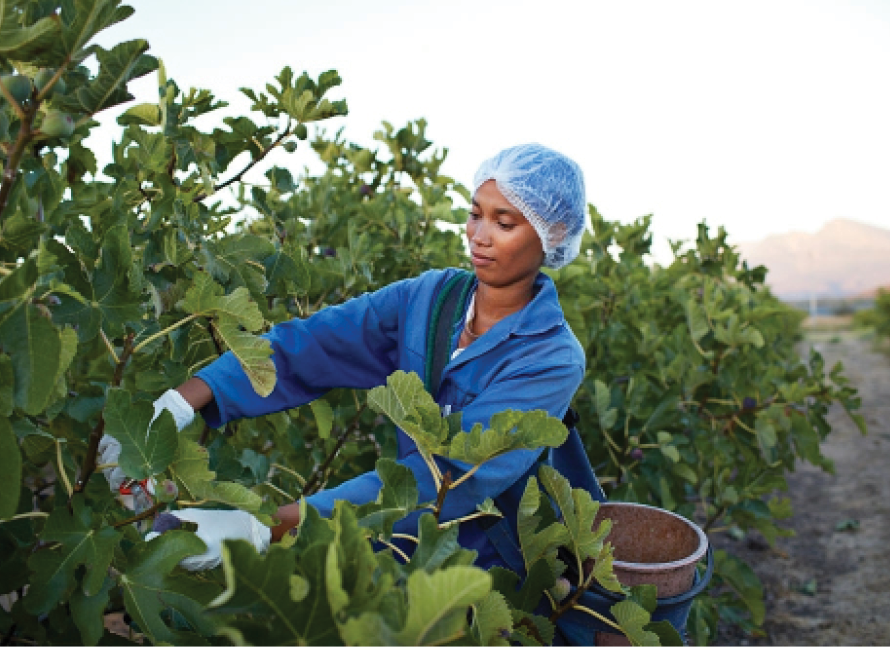 Detailing how the process will unfold, Agriculture, Land Reform and Rural Development Minister Thoko Didiza says during this period, government will issue advertisement notices of 896 farms measuring
Detailing how the process will unfold, Agriculture, Land Reform and Rural Development Minister Thoko Didiza says during this period, government will issue advertisement notices of 896 farms measuring
700 000 hectares (ha) of underutilised or vacant State land in the following provinces:
- The Eastern Cape has received an allocation of 43 000 ha.
- Free State and KwaZulu-Natal have been allocated 8 333 ha and 3 684 ha, respectively.
- Limpopo will disburse 121 567 ha to beneficiaries.
- Mpumalanga will receive 40 206 ha.
- The Northern Cape and North West will, respectively, release 12 224 ha and 300 000 ha.
No land will be advertised in Gauteng and the Western Cape.
Addressing media recently, Minister Didiza says notices will be placed on local, district and provincial newspapers, websites and local radio stations.
Application forms will be made available at the district offices and provincial offices of the Departments of Agriculture, Land Reform and Rural Development, as well as municipal district offices.
Both successful and unsuccessful applicants will be informed of the outcome in writing. The Minister says unsuccessful applicants will have an opportunity to register their appeals with the Land Allocation Appeals Committee.
Land Allocation Enquiry Process
Outlining the Land Allocation Enquiry Process, Minister Didiza says this will be ongoing on State land that is already occupied without formal approval from the department.
“Such enquiry will assess farms that have been acquired through the Proactive Land Acquisition programme. The land enquiry will investigate and determine how individuals and communities, who are currently occupying the land, got access to it,” she says.
The enquiry is also expected to look at how the land is currently being utilised and whether such use is in accordance with the agricultural practices for the area.
Where such land has been used for settlement Minister Didiza says an assessment will be done, together with the departments of Human Settlements, Water and Sanitation; and Environment, Forestry and Fisheries.
Based on the outcome of the assessment and recommendation, a decision will be taken on the future of such occupations. Government will offer successful lessees a 30-year leasehold, with an option to buy.
“This form of leasehold places certain obligations on the State as the lessor and beneficiaries as the lessees,” she says.
Beneficiary responsibilities
All beneficiaries who have been allocated State land and signed lease agreements will be subjected to a compulsory training programme.
The training programme will include entry level training on the commodity of their choice, basic record keeping, and basic financial management, as well as enterprise development.
1. The lease agreement signed between the State and the beneficiary will be a legally binding contractual agreement.
2. The lease agreement will not be transferable under any circumstances.
3. The beneficiary will not be allowed to sublease or sublet a portion of land or the whole of the farm under the leasehold between him/her and the State.
4. The beneficiary has an obligation to maintain all the infrastructure and upkeep of the land allocated to him/her.
5. The beneficiary will have to manage, maintain and keep the record of assets received from the State.
6. Any investment made by the beneficiary must be recorded, valued and reported to the State.
7. Beneficiaries will pay a monthly or annual rental fee per hectare, determined by the State, consistent with the value of the land in line with area valuation.
8. A credit management system will be put in place to manage debt recovery and management.
Failure to comply with any of the contractual obligations listed above, the State will consider the option of terminating the lease.
Government responsibilities
1. Enter into a lease agreement with the beneficiary, 30 days after approval of the application.
2. Ensure that basic infrastructure is in good shape and register the infrastructure and assets on the farm.
3. Issue monthly invoices to the beneficiary with payment due dates.
4. Undertake quarterly inspection visits by the Land Administration Unit to ensure that State infrastructure and assets are well kept.
5. Table annual reports on the performance of the lease and productivity of the land to the Minister.SAnews.gov.za
Train delivers health services
Train delivers health services SiboneloSouth Africans are receiving free health treatment thanks to the Phelophepa Train service. 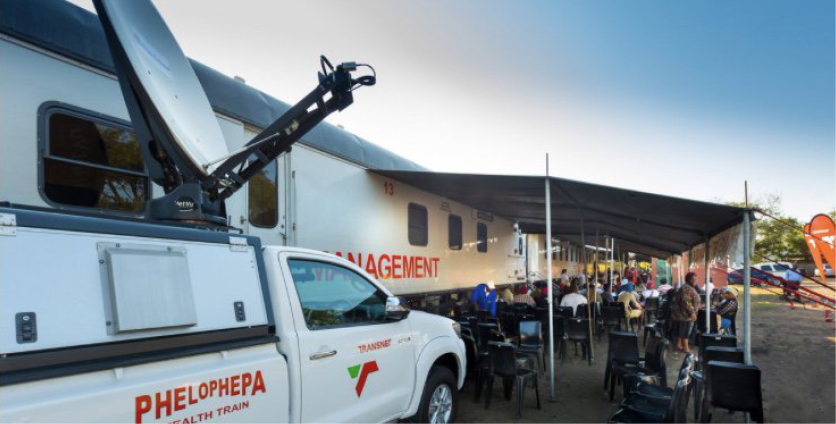
The Phelophepa Train has been servicing communities across the country since 1994 in optometry, dental and general health services.
Head of the Transnet Foundation, which runs the Phelophepa Train, Molatwane Likhethe, says people using the train's services can get a new pair of glasses within an hour of completing an eye test; do a dental X-ray or tooth extraction; screen and test for diabetes and cancer; and access medicine from the train’s pharmacy.
The train also has an on-board psychology clinic to help deal with cases of mental health patients.
“The Phelophepa Train service travels along the rail corridors of the country delivering a basket of health services through its 19 carriages. The train stops for two weeks in each stop and offers the onboard medical services as well as training to community health workers.”
The Phelophepa Train’s pharmacy can process
20 000 medicinal scripts each year. The pharmacy charges R5.00 for each prescription script. People who are 16 years old and less in age are not charged.
The train specialises in servicing rural areas but this year, due to the Coronavirus Disease (COVID-19) pandemic, all normal services were suspended and the focus was on screening and testing of COVID-19.
“When Lockdown Level 5 was declared in the country the train was reprioritised to assist with the pandemic. We deployed the trains to KwaZulu-Natal and Eastern Cape where the National Department of Health needed urgent assistance,” says Likhethe.
The Phelophepa Train service, which for the first time this year is in Gauteng, will expand its dental and cancer services. Likhethe says that they are looking to expand the train's footprint in rural communities.
Community members looking to find out when the train will service their communities can visit the Transnet Foundation’s website on http://transnetfoundation.azurewebsites.net/phelophepa.html.
Transforming the agricultural sector
Transforming the agricultural sector JoyRecently, the Department of Agriculture, Land Reform and Rural Development (DALRRD) announced that members of the public will be able to apply to lease 700 000 hectares of underutilised or vacant state land in seven of the provinces.
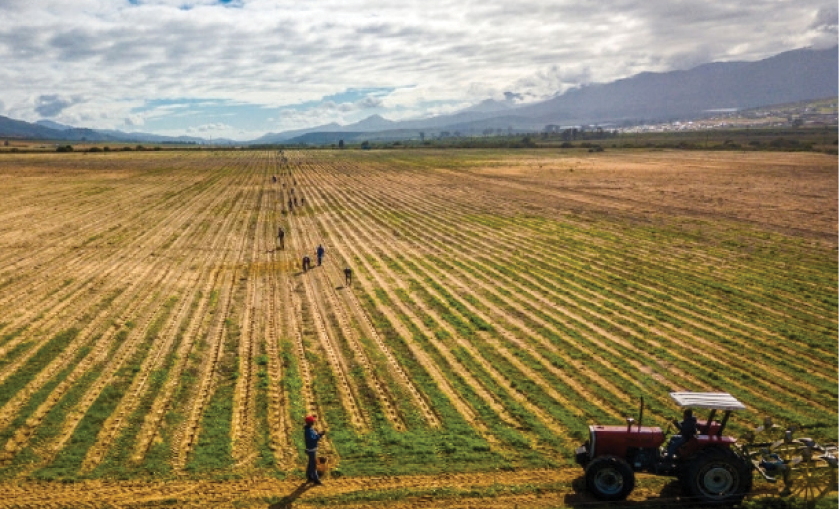 Agricultural land is the mainstay of our natural resource base. The availability and sustainable use of farmland to grow crops and for animal husbandry is key to our very survival.
Agricultural land is the mainstay of our natural resource base. The availability and sustainable use of farmland to grow crops and for animal husbandry is key to our very survival.
South Africa has vast tracts of land suitable for agricultural production, with 37,9% of our total land area currently being used for commercial agriculture.
Like many other countries, our arable land is under threat from land degradation, water scarcity and urban encroachment. We are also losing prime agricultural land through land-use changes.
Given our history, broadening access to agricultural land for commercial production and subsistence farming is a national priority.
Although the post-1994 land reform process has resulted in more land being restored and restituted to black South Africans, the pernicious effects of the 1913 Natives Land Act continue to be in patterns of farmland ownership.
The Act went far beyond dispossessing millions of people of their ancestral land.
With land ownership still concentrated in the hands of the few, and agriculture primary production and value chains mainly owned by white commercial farmers, the effects of our past remain with us today.
The continued monopolization of a key means of production like land is not just an obstacle to advancing a more egalitarian society; it is also a recipe for social unrest.
The hunger for land to farm is growing, especially amongst the rural poor. And for a number of reasons, the pace of land reform in this particular sector has been slow and unsatisfactory.
Transforming patterns of agricultural land ownership is vital not just to address the historical injustices of the past, but to safeguard our nation’s food security.
As noted in the 2019 report of the Presidential Advisory Panel on Land Reform and Agriculture, “whilst we export food, back home 41% of people in rural areas and 59,4% in urban areas have severely inadequate access to food.”
Agrarian reform has been a priority of successive administrations since democracy.
Between 1994 and March 2018 the State has delivered 8,4 million hectares of land to previously disadvantaged individuals under the land reform programme. But this progress amounts to less than 10% of all commercial farmland.
In my State of the Nation Address earlier this year I committed that state-owned agricultural land would soon be released for farming. This is a major milestone in the agrarian reform process, and gives effect to the promise of the Freedom Charter that the land shall be shared among those who work it.
Our redistributive vision aims to strike a balance between social justice and redress, and enhancing agricultural output by bringing more black farmers into the mainstream of the economy.
Land is a productive asset that generates profit and can be used for collateral to secure other assets.
We have to ensure that land acquired for farming purposes is productively used. To safeguard the allocated state land for farming purposes, the lease is not transferrable. Beneficiaries will sign a lease agreement with the State and pay a rental fee consistent with the land value.
We must also ensure that farmers are supported along the road to sustainability and profitability.
As part of this programme, beneficiaries will be trained in financial management and enterprise development. Experience has shown that emerging and small-scale farmers often lack the financial skills to exploit market opportunities and integrate with value chains.
We are prioritizing women, youth and persons with disabilities as beneficiaries.
There has been demonstrable success with empowering women farmers under the existing Proactive Land Acquisition Strategy.
In a number of provinces, women who have been allocated farms by the DALRRD have been able to run them successfully and even move into commercial production.
In addition to the land acquisition itself, the department continues to invest in infrastructure, equipment and machinery to enable these entrepreneurs to run successful businesses.
Broadening access to land and opportunities for farming will support job creation and enterprise development, and improve the market for food, agricultural goods and services.
The ultimate goal of releasing these land parcels is to transform the agricultural landscape by growing a new generation of farmers. Leasing land under such favourable conditions must spur them to think big; to not just grow their own businesses but to advance shared wealth and prosperity in the communities in which they farm.
They must heal the deep divisions of our past. They must dispel the stereotype that only white farmers are commercially successful in South Africa, and that black farmers are perpetually ‘emerging.’
In working this land; in turning it to productive use, they will indeed turn swords into ploughshares. They will become the faces of national reconciliation.
University students return to campus
University students return to campus JoyThe higher education sector is now able to welcome back 100% of university students.
 This is according to Higher Education, Science and Innovation Minister Blade Nzimande, who said all international students who were outside the borders of South Africa during the national lockdown period can now return and resume with their studies on campus.
This is according to Higher Education, Science and Innovation Minister Blade Nzimande, who said all international students who were outside the borders of South Africa during the national lockdown period can now return and resume with their studies on campus.
“All universities are implementing their plans to return all students and staff from the beginning of October, subject to any restrictions linked to their own risk assessment due to their local context and conditions. It must however be noted that the prescripts of the Department of
Cooperative Governance and Traditional Affairs (CoGTA) regulations will apply,” the Minister says.
This means that the health and safety protocols in terms of physical distancing (at least 1.5m), wearing masks, washing hands, sanitising and environmental cleaning will be applied.
He says institutions of higher learning will now be able to move to a 50% occupancy of rooms up to a maximum of 250 persons indoors at a time, with ventilation of rooms remaining critical.
He added that international students returning to South Africa will need to meet the requirements of the CoGTA regulations, which include having a test not older than 72 hours, showing that they are negative for the virus on arrival in South Africa.
If tested positive, the Minister says they will need to go into quarantine at their own expense for at least 10 days before proceeding to their respective institutions.
“Universities have been implementing their own return strategies in line with their teaching and learning and campus readiness plans.
This is to ensure that the health and safety and physical distancing protocols are adhered to.
“It is anticipated that as students return to campus with the move to Alert Level 1, the teaching and learning programme will advance more rapidly, with catch-up programmes for students who have not been able to engage satisfactorily to be implemented,” he says.
In terms of completion of the 2020 academic year, the Minister says 10 universities aim to complete the academic year before the end of the 2020 calendar year, four universities plan to end in January 2021, seven universities plan to complete in February 2021, and five universities plan to complete in March 2021.
Minister Nzimande says this staggered ending of the academic year is linked to the ability to support all of them and to ensure that all students have been given a reasonable opportunity to succeed.
Return to residences
According to the Minister, there were 54 561 students living in university-owned residences by 22 September. This is approximately 48% of the residence capacity, with 121 000 beds across the system.
In addition, there were a further 49 360 students living in university-leased and managed accommodation, 21 022 students living in university accredited private accommodation and 34 594 students living in other forms of private accommodation.
“Some institutions have indicated that not all students are taking up their invites to return to campuses, preferring to continue to work remotely,” says the Minister.
“While we understand and accept this, given the fear that parents and students still have, we want to encourage parents and students to ensure that teaching and learning is not compromised, as we would not like to see a lower pass rate in this academic year, to the extent that we can help it,” he adds.
The Minister says Higher Health has capacitated over 13 000 frontline staff across campuses that are working towards assisting Coronavirus Disease (Covid-19) response daily through continuous onsite trainings.
Furthermore, over 3 200 student and staff volunteers have been trained and capacitated to participate in implementing Covid-19 daily screening, prevention and education initiatives.
“Over 12 000 individuals have been trained through scientific knowledge to recognise and appropriately manage the Covid-19 pandemic within our post school education and training sector,” he says.
Innovation by Higher Health
Minister Nzimande added that Higher Health had also introduced other innovative measures and solutions.
The latest being a 24-hour dedicated toll-free, Higher Health student mental health support service, run through a dedicated team of experienced psychologists, social workers, and counsellors from the South African Depression and Anxiety Group.
“The service supports all our students and campus communities on mental health challenges, survivors of gender-based violence and other psychosocial health challenges due to Covid-19,” says the Minister.
Watch out for job scams
Watch out for job scams SiboneloJob seekers are falling victim to scams from people claiming to be genuine labour brokers or employers.
A job scam is one of the growing crimes in South Africa, with various scams used to try and make people pay for jobs that do not exist. They are also used in human trafficking and to recruit people for criminal activities.
Many of these scams are conducted by false labour brokers and fake companies and it is important to only use brokers and companies registered with the relevant authorities, such as the Department of Employment and Labour (DEL).
The Director for Private Employment Agencies at the DEL, Martin Ratshivhanda, says genuine labour brokers are registered with the department’s Labour Centre and are governed by law.
A registered private employment agency must display its certificate of registration in a visible place at its offices, says Ratshivhanda.
Registered labour brokers are not allowed to charge the prospective employee a fee for finding them a job.
In addition, they may not provide false employment information, retain original identity documents (ID) or original qualification certificates or deduct any money from the employee’s wages.
According to Ratshivhanda, genuine labour brokers must protect job seekers’ personal information.
Job seekers can find registered labour brokers by visiting their nearest Labour Centre or visiting the DEL's website at www.labour.gov.za.
Genuine businesses wanting to register as labour brokers can visit www.e-services.gov.za.
They must have certified copies of:
- SARS tax compliance certificate, issued within the past year.
- A sole business owner must submit a personal tax clearance certificate.
- The physical address that the business operates from.
- A certified copy of the ID document (or passport if non-citizen) of the applicant.
When music and art collide
When music and art collide SiboneloNico Phooko the music painter, one of Africa's most gifted visual artists, has been selected as a Bakanal de Afrique (BdA) 2020 Fellow. He will join 50 other talented Africans to create artwork that will be featured in the virtual BdA Afro Urban Festival in November 2020.
The festival celebrates the journey of people through art and culture and includes various creative disciplines, from filmmaking and dance to music and visual art.
“This is an opportunity for my ‘Notes ‘n Strokes’, sharing the journey of my music-inspired work, which is the art of making music and the music of making art,” says Phooko.
Phooko, who says his love of art has been with him since birth, has always been an artist. He promotes the concept of live painting, in which he captures the spirit of special events live on canvas.
“I create my own music and also collaborate with other musicians. I paint live on stage, using notes for various strokes,” he says.
Phooko, who was born in KwaThema and now lives in Boksburg, Ekurhuleni, studied graphic design basics and fine art at the Johannesburg Art Foundation.
Art helped him to stay away from the social ills that many township people face, as it kept him focussed and grounded.
Art can open up opportunities for growth and have an impact in a person’s life as it is a mirror of society, says Phooko. “If it becomes a good skill and is marketed professionally, it can also be a very good business.”
To young and aspiring artists, Phooko says, “Be yourself. Originality makes for unique, gifted people. Stay inspired and focussed.”
Phooko facilitates art workshops with young up-and-coming artists. “I want to impart the skills and knowledge that were sowed and ploughed in me. I want to help them understand the professional art world.”
Phooko has exhibited his art in most parts of the world and says young artists can get involved in these workshops by applying online. Keep
an eye on his Facebook page: @nicophookothemusicpainter.
To view the online exhibition in November, visit www.bakanaldeafrique.com